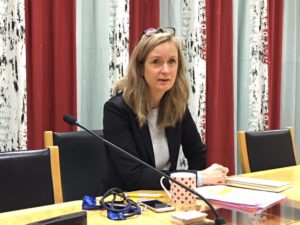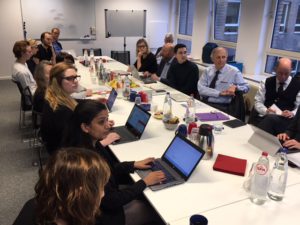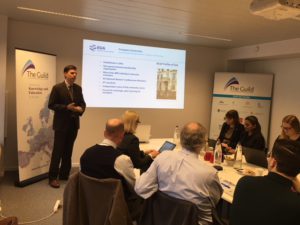(Original Swedish post published 4 February.)
Early on Thursday morning the Management Council defied the snow and set off for Brussels to combine this semester’s overnight conference with a study visit. A change of perspective provides inspiration for strategic discussions.
We had a packed programme, starting with an introduction to the Swedish government’s work in Brussels. At the Permanent Representation of Sweden to the European Union we met Ambassador Åsa Webber and Daniel Sjöberg, who works with Swedish MEP Cecilia Wikström (who was unfortunately unable to attend) at the European Parliament. Åsa, Daniel and Cecilia all happen to be Uppsala alumni.
The European Commission led by Jean-Claude Juncker is coming to the end of its period in office. They are trying to follow up and highlight the issues the EU has been working on. Right now, the big issues for the future are Brexit, the negotiations ahead of the EU’s multiannual budget and the run-up to the elections to the European Parliament in May 2019.
Naturally, we wanted to focus on developments in the area of research and education. Negotiations are now in progress on the next framework programme, the seven-year research programme that will replace Horizon 2020 and is provisionally referred to as FP9 (Framework Programme 9), and on the future of Erasmus+. In many ways, Brussels is one great negotiating machine, which is now firing on all cylinders. Johannes Jarlebring, Uppsala University’s EU strategist, gave us a thorough briefing on how decisions are made in Brussels, and how we can get involved, provide input and influence decisions.
As you probably know, Uppsala University is a member of The Guild of European Research-Intensive Universities. In the afternoon we went on to the Guild Office. This is a kind of home office for us when in Brussels, so it’s both convenient and relaxing to be able to hold meetings there.
On Thursday afternoon we met Secretary-General Jan Palmowski, who talked about the most important issues on The Guild’s agenda. After that, Thomas Midtgaard, expert at the European Commission, talked about the Commission’s work on FP9 and President Macron’s call for European Universities. Dan Andree from Vinnova and Ana Beramendi from the Swedish Research Council told us about their work. Vinnova and the Swedish Research Council have a joint office in Brussels these days.
A busy day ended with further discussions over an enjoyable dinner.
On Friday morning we continued with a programme that had a greater focus on education issues, beginning with a talk by Thomas Jørgensen, policy officer at the European University Association (EUA), another network of which we are a member. What will happen to the Bologna Process in future? How will Erasmus+ develop?
We also learned more about the European Research Council (ERC), one of the most successful and prestigious parts of the EU framework programme for research. Anna Lönnroth told us more about how it works and about plans for the future. The final guests in our programme were representatives of the Commission working with the European Institute of Innovation and Technology’s Knowledge Innovation Communities. Uppsala University is involved in three of them: InnoEnergy, Health and Raw Materials. They also talked about plans ahead of the new framework programme FP9.
We concluded with a regular Management Council meeting which also gave us a chance to sum up our impressions. How can we equip ourselves and prepare for the new research programme? What do we need to work on more at home? Can we benefit from experiences from the projects in which we have been involved? How do we conduct and use analyses? Should we draw up an EU strategy? Uppsala University is a member of several European networks: The Guild, EUA, Coimbra and U4. It’s important for us to be aware of how we can best use each of these networks.



